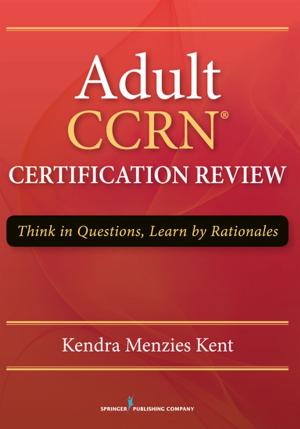Obesity 101
Nonfiction, Health & Well Being, Psychology, Eating Disorders, Health, Nutrition & Diet, Weight Loss| Author: | Lauren Rossen, PhD, Eric Rossen, PhD | ISBN: | 9780826107459 |
| Publisher: | Springer Publishing Company | Publication: | September 19, 2011 |
| Imprint: | Springer Publishing Company | Language: | English |
| Author: | Lauren Rossen, PhD, Eric Rossen, PhD |
| ISBN: | 9780826107459 |
| Publisher: | Springer Publishing Company |
| Publication: | September 19, 2011 |
| Imprint: | Springer Publishing Company |
| Language: | English |
"This resource is an exciting new book that features a balanced perspective about one of the most talked abouttopics of this time...it would be a great resource for those who are interested in joining the fight to eradicate obesity and obesity-related consequences."--Journal of Nutrition Education and Behavior
"Lauren and Eric Rossen offer a well articulated account of the growing obesity epidemic in todayís society in an engaging, easily understood, and witty manner. This comprehensive volume should serve as an essential resource for researchers, clinicians, students, and the general public interested in the fundamental understanding, assessment, treatment, and prevention of obesity."
Jason P. A. Gallant, Ph.D.
Chief Psychologist
Boys Town Central Florida Behavioral Health Clinic
Although research on obesity has accelerated over the past decade, the proportion of Americans considered obese has not declined. In order to address this critical public health challenge, obesity research has recently shifted from focusing purely on individual causes to viewing individuals within their "obesogenic" or living environments. Encompassing both schools of thought, Obesity 101 is the first volume to offer a broad and balanced perspective on the complex factors that influence obesity.
The text combines current research from multiple perspectives to provide an introductory-level, reader-friendly overview of the history, causes, prevalence, consequences, treatments, and future trends in the prevention of obesity. It integrates research from a vast range of disciplines in the biological and social sciences, as well as education and economics. The text explores the gamut of current treatments for obesity, in addition to prevention programs in schools, the workplace, the community, and the arena of public policy, and offers an assessment of their efficacy. Since obesity is a burgeoning problem in the developing world, as well as having already reached epidemic proportions in many developed nations, the book also discusses international trends.
Key Features:
- Brings together the most current obesity research from a variety of disciplines
- Provides a balanced review of one of today's most controversial health issues
- Discusses the various medical, psychological, social, educational, and occupational consequences of obesity for children and adults
- Reviews the effectiveness of prevention and treatment programs, as well as interventions
- Accessible, conversational writing style designed for use by undergraduate and graduate students, in addition to professionals across many disciplines
"This resource is an exciting new book that features a balanced perspective about one of the most talked abouttopics of this time...it would be a great resource for those who are interested in joining the fight to eradicate obesity and obesity-related consequences."--Journal of Nutrition Education and Behavior
"Lauren and Eric Rossen offer a well articulated account of the growing obesity epidemic in todayís society in an engaging, easily understood, and witty manner. This comprehensive volume should serve as an essential resource for researchers, clinicians, students, and the general public interested in the fundamental understanding, assessment, treatment, and prevention of obesity."
Jason P. A. Gallant, Ph.D.
Chief Psychologist
Boys Town Central Florida Behavioral Health Clinic
Although research on obesity has accelerated over the past decade, the proportion of Americans considered obese has not declined. In order to address this critical public health challenge, obesity research has recently shifted from focusing purely on individual causes to viewing individuals within their "obesogenic" or living environments. Encompassing both schools of thought, Obesity 101 is the first volume to offer a broad and balanced perspective on the complex factors that influence obesity.
The text combines current research from multiple perspectives to provide an introductory-level, reader-friendly overview of the history, causes, prevalence, consequences, treatments, and future trends in the prevention of obesity. It integrates research from a vast range of disciplines in the biological and social sciences, as well as education and economics. The text explores the gamut of current treatments for obesity, in addition to prevention programs in schools, the workplace, the community, and the arena of public policy, and offers an assessment of their efficacy. Since obesity is a burgeoning problem in the developing world, as well as having already reached epidemic proportions in many developed nations, the book also discusses international trends.
Key Features:
- Brings together the most current obesity research from a variety of disciplines
- Provides a balanced review of one of today's most controversial health issues
- Discusses the various medical, psychological, social, educational, and occupational consequences of obesity for children and adults
- Reviews the effectiveness of prevention and treatment programs, as well as interventions
- Accessible, conversational writing style designed for use by undergraduate and graduate students, in addition to professionals across many disciplines















